Iran Cuts Off Fingers Of Young Man Over Robbery
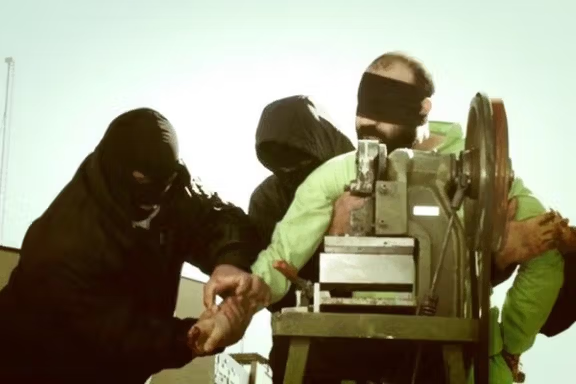
Despite numerous calls on to stop amputation of prisoners convicted of robbery, Iran has cut off four fingers of a 28-year-old man, with seven more on the list to receive the draconian punishment.

Despite numerous calls on to stop amputation of prisoners convicted of robbery, Iran has cut off four fingers of a 28-year-old man, with seven more on the list to receive the draconian punishment.
Hengaw Organization for Human Rights, a Kurdish rights group, reported on Saturday that the convict, identified as Morteza Jalali, was transferred from another prison to Tehran’s Evin prison for the amputation last week.
His fingers were cut off with a guillotine-like device that the prison recently acquired at the infirmary of the detention center.
Iran has amputated fingers of several prisoners during the past few months while authorities said several cases of amputations for robbery are currently at the execution stage, calling on judges not to hesitate to issue death and amputation sentences.
Late in June, the head of the Iranian association of surgeons, Iraj Fazel, called on the judiciary not to allow the amputation of fingers to punish thieves, describing the practice as "worrying and horrifying."
According to Islamic Sharia law, punishment for theft can be amputation of fingers or hands.
Human rights group Amnesty International said late in July that Iranian authorities must be held accountable for amputating the fingers of prisoners. “These amputations are particularly harrowing displays of the Iranian authorities’ contempt for human rights and dignity,” said Diana Eltahawy, a deputy director of the group.

Ahmad Khatami, spokesman of Iran’s Assembly of Experts (AoE), says they have discussed the criteria for choosing the next Supreme Leader during the past week.
Khatami told reporters on Wednesday, September 7, that recent public discussions about Supreme Leader’s succession were simply rumors. He did not elaborate, but it was obvious that he was speaking about widespread discussions on social media about Ali Khamenei's son, Mojtaba, being groomed to be the country's next leader.
According to Etemad Online, Khatami had said in December 2015 that a secret committee has been formed to determine probable successors for the Islamic Republic's Supreme Leader Ali Khamenei.
At the time he said that the identity of the three committee members would remain concealed from the other members, while they would work on a list of eligible candidates for succession, adding that the committee was formed based on advice by Khamenei.
Khatami was criticized at the time for the comment as some of the members of the AoE said there was no point in having an assembly with over 60 members if only three people are going to make the decision about succession.

Selecting a successor for the Supreme Leader and disqualifying an existing supreme leader are the main responsibilities of the Assembly of Experts. However, on the only occasion to determine a leader in 1989, it was the assembly's deputy chief Akbar Hashemi Rafsanjani who imposed his choice of the next leader on others and named Khamenei as a temporary leader "until a final decision on succession is made."
After harsh criticism by several Assembly members, Khatami said as a second thought that "The committee has only discussed the characteristics of the leader and the criteria to choose one." He even said that "the committee has been active for many years based on the Iranian Constitution," and that "its job is to determine who is potentially eligible to become the leader, rather than determining a leader."
He added that "Khamenei told the committee several times that the AoE should have quite a few next leaders up their sleeves."
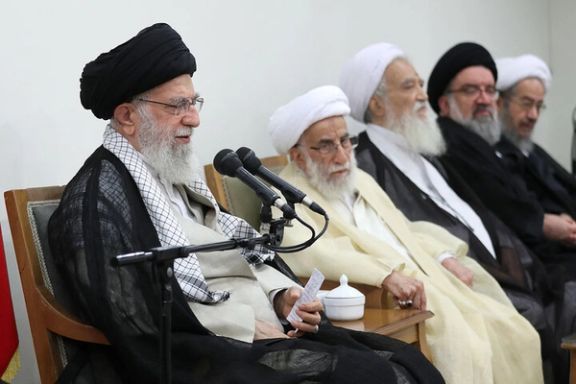
Ayatollah Mohsen Araki who was a member of the assembly in 2009 told Fars news agency, there is a confidential list of potential supreme leaders. He said the committee holding the confidential list was known as "the research committee." Araki added that AoE members can suggest more names to be added to the list. However, when he was asked how many names are already on the list, he answered: "We do not know. It is one-hundred-percent confidential. Only the three members of the committee know the names." Parts of Araki's comments are still available on the official news agency (IRNA).
Another Assembly of Expert member in 2009, Ayatollah Hashem Hashemzadeh Harisi said that "the committee's only job is to determine the criteria for choosing the next leader. They are tasked with doing research not with determining the leader."
Harisi clarified further that "This is not an important committee, therefore, there should not be any public sensitivity about it. This committee is formed within the Assembly of Experts, but it is not important. It does not have any authority, and it is not legal. Therefore, it does not have much of an impact and it is not entitled to determine who is going to be the Islamic Republic's next leader."
The most interesting part of Araki's comments was that "The committee can name eligible next leaders from Iran or elsewhere including An-Najaf in Iraq" where Iraq's biggest seminary is located. However, he added that although there is no condition about the next leader's nationality in the regulations, but when it comes to choosing the next leader, being an Iranian will be one of the criteria."
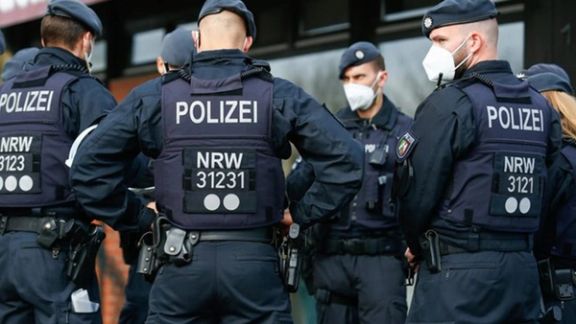
Germany has arrested four members of a gang smuggling narcotics from Iran in an operation that is reported as the country’s largest-ever seizure of heroin.
Prosecutors said on Friday that police confiscated 700 kilograms (1,543 pounds) of heroin in the port city of Hamburg at the end of August, but the arrests were made overnight on Thursday, September 8, when police searched 10 premises in the eastern cities of Dresden and Chemnitz, as well as in Hamburg and in the Netherlands.
The detainees were an unnamed 35-year-old Iranian in the Netherlands, a 40-year-old Turkish-Serbian suspected ringleader, a 54-year-old German suspected of using his firm's logistics fleet to transport drugs, and a 53-year-old Turkish go-between.
One was detained in Germany, one in Spain, and two others in the Netherlands. Prosecutors are seeking the extraditions of the three who were arrested abroad.
Last year in September, Indian officials said they had seized nearly three tons of heroin originating from Afghanistan and shipped from Bandar Abbas Port in Iran to Gujarat Mundra port worth an estimated 200 billion rupees ($2.72 billion). More than 2,988 kg of heroin was recovered in one of India's biggest such hauls to date.
In May, Jordan said Iran-backed forces in the Syrian army and militias loyal to Tehran are trying to smuggle hundreds of millions of dollars’ worth of drugs across the Jordanian border to Persian Gulf markets.
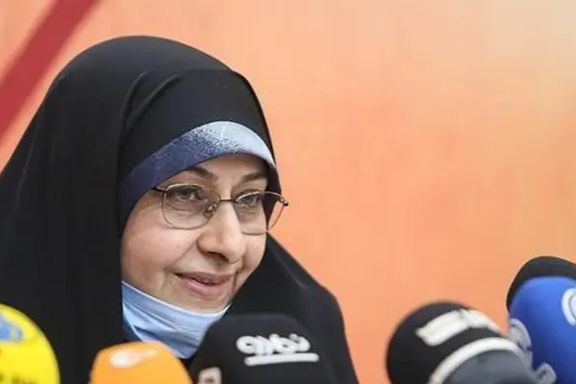
A full-blown controversy has again erupted in Iran over top officials sending their family members to live in the West, while they chant revolutionary slogans.
One day after Iran's President Ebrahim Raisi warned his officials on September 7 to prevent their children's immigration to other countries, social media activists revealed that Vice President Ensieh Khazali's son has been living in Canada for several years.
Raisi had even warned that if an official's offspring migrates from Iran, the father needs to resign and follow his child. He obviously never thought that the next official whose son's immigration will be revealed could be a woman.
Khazali denied the report about her son's immigration and said he was on a short visit to Canada to further "knowledge-based" research. This is one of the favorite terms of Iran's Supreme Leader Ali Khamenei who has nicknamed the current year as "the year of knowledge-based production."
Subsequently, Iranians on social media revealed that Khazali's son, Hamid Rezazadeh, has been running a company in Canada, which sells VPNs to Iranians who need to circumvent government censorship of the Internet. Ms. Khazali is an advocate of limiting Iranians' access to the Internet.
Iranians have been particularly angry about an intensified government effort r to further limit access to social media and websites by slowing down internet connection and other technical measures.
Some asked Ms. Khazali why her son did not go to Russia or China for "knowledge-based” research. Iranian cleric Rahmatollah Bigdeli in a series of tweets called on Khazali to resign and at the same time, revealed that some other officials’ children including Tehran Mayor Alireza Zakani, and former Majles Speaker Gholam Ali Haddad Adel are also living abroad.
Iranian hardliners usually frown at the immigration of the officials’ family members and some like former Majles Speaker Ali Larijani were barred from running in elections.
A figure of 5,000 family members of senior officials living abroad was cited in 2020 by Mohammad Gharazi, a former minister. In November 2021, Alireza Salimi, a member of parliament, suggested that officials under former President Hassan Rouhani, including deputy ministers had moved to Europe due to fears they would be banned from leaving the country.
In 2019, Brian Hook, special representative for Iran (from 2018 to 2020) under President Donald Trump told Iran International that “children of Islamic Republic officials live rich and comfortable lives in the United States and other countries while Iranian people live in terrible conditions.” Hook said this showed “the regime’s hypocrisy.”
In May this year,General Morteza Mirian, commander of Iran’s Revolutionary Guards’ ground forces, claimed that 4,000 relatives of “senior officials” live in the United States, Canada, and Europe.
During a live television show the General said that they should be “tracked” so as not to be allowed back to Iran to take up managerial positions.
On Friday, Iranian sociologist Javad Miri told Etemad Online website that some Iranian officials send their children to the United States and Canada although they always chant slogans in support of the "struggle against arrogant powers." He quoted some officials as saying that sending their children abroad is part of their campaign against "imperialism".
He added: "Some Iranian officials' attitudes toward the West has changed and they see sending their children to Western countries as an opportunity." He added that "Iranian officials wish to strengthen their network within the Iranian government by sending their children to study in the West," presumably to prepare for occupying positions of power when they return to Iran.
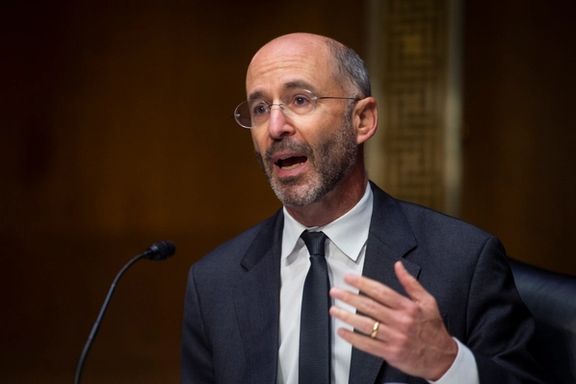
The US Special Representative for Iran Rob Malley has met with Jewish groups after an unexpected lag in Iran nuclear negotiations following several weeks of progress.
Malley met on Thursday with the leaders of several US Jewish organizations, including The Jewish Federations of North America (JFNA), Conference of Presidents of Major American Jewish Organizations, Union for Reform Judaism, American Jewish Committee, Democratic Majority for Israel and AIPAC, the Jewish Insider reported on Friday.
Participants declined to share information about what was discussed, but a JFNA spokesperson said that “Federations appreciated the engagement from the White House, and we’re pleased the meeting took place.”
Most of the participants had publicly criticized the 2015 Joint Comprehensive Plan of Action – or the JCPOA -- and similarly spoken out against ongoing nuclear negotiations with Iran.
Earlier in the day, a statement by the Israeli Prime Minister’s Office said Mossad chief David Barnea has shared "sensitive intelligence materials" with heads of CIA, FBI, Pentagon and other top officials, warning US against being cheated by the Islamic Republic’s lies.
Earlier in September, Yair Lapid said the country is leading “an intensive campaign” meant to prevent the signing of “a dangerous” nuclear deal between Iran and world powers.
US Ambassador to Israel Thomas Nides said on September 5 that President Joe Biden has assured Lapid that Washington will never tie Israel’s hands against Iran.
Also on Friday, Republican Senator Lindsey Graham of South Carolina predicted that a new Iran deal will not be finalized until after the upcoming US midterms and Israeli elections, set for November 1, and talked of plans for multiple legislative initiatives aimed at countering Tehran.
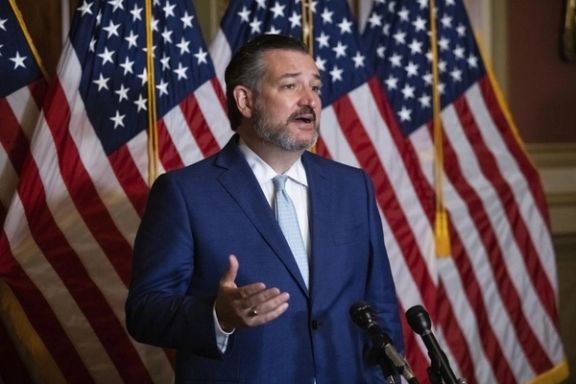
US Senator Ted Cruz told Iran International that reviving the 2015 nuclear deal will be “disastrous and absolutely catastrophic,” warning the administration against its repercussions.
Expressing hope that the talks to restore the deal go nowhere, the senator for Texas told our correspondent Arash Aalaei on Thursday, "The Biden White House seems bound to shovel hundreds of billions of dollars into the hands of a theocratic despot who routinely chants 'death to America' and 'death to Israel'."
“If this deal goes through, that money will be used to murder Americans and our allies, and it would dramatically accelerate the process of the Ayatollah getting a nuclear weapon which if God forbid, he does, could well be used to murder millions of Americans,” he added.
Cruz went on to criticize President Joe Biden’s foreign policy, which, he claims, have emboldened Russian President Vladimir Putin to attack Ukraine. “This (Ukraine) war should never have happened. It only happened because of Joe Biden's weakness and appeasement.”
“First of all, in surrendering Afghanistan and signaling weakness to all of our enemies, but then secondly in waiving sanctions on Nord Stream 2 pipeline, handing a multi-billion-dollar gift to Putin, which was the direct and incipient cause of Putin's invasion of Ukraine,” he said.